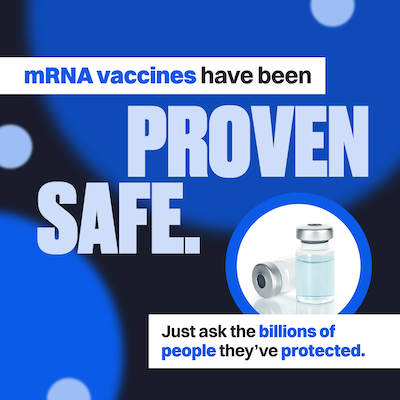Florida surgeon general endorses anti-vaccine myths
In the final weeks of 2023, some old but persistent myths about COVID-19 vaccines reemerged. Florida’s surgeon general, who has a history of promoting false claims, called for a ban on mRNA COVID-19 vaccines due to alleged cancer risks. Meanwhile, some popular social media accounts misrepresented news about disease outbreaks and research about mRNA vaccine technology to falsely claim that COVID-19 vaccines are causing “mysterious” and deadly diseases.
For even more resources, check out the menu above for real-time insights, training resources, and more. Specifically curated for doctors and other health care providers, these links provide actionable content to help navigate today’s information landscape.
Trending narratives from the past month
Florida surgeon general endorses anti-vaccine myths to oppose mRNA vaccines
In the first week of the new year, Florida Surgeon General Joseph Ladapo issued a press release calling for a halt to all mRNA COVID-19 vaccine use due to the alleged risk posed by residual DNA fragments in the vaccines. His statement followed a letter asking the CDC and FDA to address concerns about DNA contamination and the risk of DNA integration and cancer from COVID-19 vaccines. Previous Florida Health Department statements helped fuel global waves of false claims about COVID-19 vaccine safety. Read the fact checks here and here.
Vaccine skeptics baselessly link disease outbreaks to COVID-19 vaccines
An outbreak of pneumonia in China and the U.S. led some to speculate that the disease may be linked to COVID-19 vaccines. The false narrative that any unusual or unexplained illness reported since the COVID-19 vaccine rollout must be a vaccine side effect has persisted for nearly as long as the vaccines have been available. The trend continued in December when a popular conspiracist relied on a recent study to falsely claim that heart failure associated with COVID-19 infection is actually caused by vaccines. Read the fact checks here and here.
COVID-19 vaccine study distorted to revive “VAIDS” myth
A recent Nature study found that artificial mRNAs like those in some COVID-19 vaccines are sometimes “misread,” resulting in a small amount of unintended proteins that induce an immune response. Notably, the researchers found no evidence of adverse reactions related to the unintended proteins, concluding that the phenomenon should be investigated to improve future mRNA technology. Some online commenters misrepresented the researcher's conclusion to claim that mRNA vaccines are dangerous, not properly tested, and cause the nonexistent effect called “VAIDS.” Read the fact checks here and here.
What you might say in response
mRNA COVID-19 vaccines are safe, as demonstrated by three years of scientific evidence and two-thirds of the global population who are safely vaccinated.
- The Florida Health Department has been a frequent source of false and unsubstantiated claims backed by faulty evidence and flawed research practices.
- The CDC and FDA responded to the health department’s misleading claims, confirming that the trace amounts of DNA fragments in COVID-19 vaccines are several orders of magnitude lower than the international standard and that rigorous testing shows no evidence of DNA integration.
- The overwhelming scientific consensus, backed by peer-reviewed research and global safety monitoring, shows that mRNA COVID-19 vaccines are safe and not linked to cancer. By contrast, the surgeon general’s letter is based entirely on a “theoretical” risk for which there is no supporting evidence.
COVID-19 vaccines don’t cause disease. They’ve protected billions against a serious and potentially deadly infection.
- As with previous claims baselessly linking COVID-19 vaccines to diseases, there is no evidence that the pneumonia cases are associated with COVID-19 vaccines, and any claims to the contrary are speculation.
- The cases were not mysterious or unexplained, as the pneumonia cases have all been linked to known pathogens.
- COVID-19 vaccines have prevented millions of hospitalizations and deaths in the U.S. and worldwide.
New research confirms the safety of mRNA COVID-19 vaccines while helping researchers improve future vaccines.
- Nonexpert social media accounts misrepresented a study designed to improve mRNA vaccine technology to advance a false narrative about COVID-19 vaccine safety.
- The study found no evidence to suggest that mRNA vaccines are unsafe. Those claiming otherwise directly contradict the researchers and other experts in the field.
- All technology is meant to develop and improve over time, and mRNA technology is no different. This study provides insight into how researchers can make future mRNA vaccines safer and more effective.
What we’re reading
- Insight News: Health misinformation is rampant on social media – here’s what it does, why it spreads and what people can do about it
- The Conversation: Misinformation: how fact-checking journalism is evolving – and having a real impact on the world
- AAMC: Is spreading medical misinformation a physician’s free speech right? It’s complicated
- KFF: KFF Misinformation Poll Snapshot: Public Views Misinformation As A Major Problem, Feels Uncertain About Accuracy Of Information On Current Events
Studies and trainings
Interested in learning more about how to debunk false claims with patients? Check out the new Infodemiology Training Program. In videos that range from 5 to 10 minutes each, the program introduces health care providers to the basics of infodemiology and provides you with actionable skills to help improve patient care. Get started today.
Quick response media assets
Below, we've provided some content in English and Spanish for you to share with your network. These videos can be used on social media to fight false claims and help provide your network with accurate information. Just click on the share button, and it will pop up in a new window.

Proposed social copy:
Some people claim that mRNA vaccines are inherently unsafe. We know that isn’t true. The overwhelming scientific consensus, backed by peer-reviewed research, global safety monitoring, and over 5.5 billion people safely vaccinated, is that mRNA COVID-19 vaccines are safe. Claims to the contrary are just speculation with no supporting evidence.

Publicación propuesta:
Algunas personas alegan que las vacunas de ARNm son intrínsecamente inseguras. Sabemos que eso no es cierto. El abrumador consenso científico, respaldado por investigaciones revisadas por pares, monitoreo de seguridad global y más de 5.5 mil millones de personas vacunadas de manera segura, es que las vacunas de ARNm contra el COVID-19 son seguras. Los alegatos al contrario son sólo especulaciones sin evidencia que las respalde.
Powered by PGP in partnership with the ABIM Foundation.
